
Forthcoming 2 April 2014 Available for Pre-Order Now
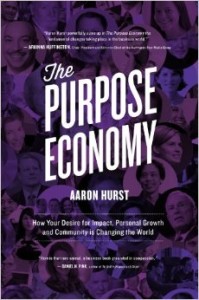
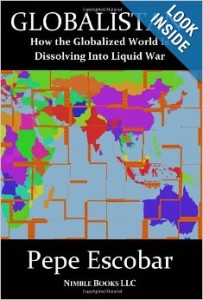
Pepe Escobar
5 out of 5 stars Tour de Force!
By Donald L. Conover
Tour de Force! That's the only way to describe Pepe Escobar's remarkable achievement with Globalistan: How the Globalized World Is Dissolving into Liquid War. In page after page, Mr. Escobar demonstrates his remarkable erudition gained in a peripatetic career, spanning the caves of Tora Bora to the slums of Sao Paolo and Mumbai; from the halls of venality to the palaces of the gluttonously wealthy; from conversations with forgotten Pentagon warlords to raps with Brazilian gang lords.
Our Neocon leaders seem to think the rest of the World is frozen in situ, waiting for them to hatch their nefarious schemes. Globalistan shows us the consequences of such a blindered [or should I say “blundered”] attitude.
Producers for the talking heads of “mainstream” media will have to have this book. It is the one volume necessary to make sense of our churning humanity in the 21st Century. A quick scan can provide the background on every crisis from Iran to “Chindia”; from Shiiteistan to the Gazprom Nation; from PetroEurostan to the Bush White House.
Escobar demonstrates why it is true that if we don't find ways to spread our prosperity around the World, the have-nots will come and take it away from us with guns and bombs and box cutters. All of the walls and fences cannot protect the United States, Europe, and Saudi Arabia from overwhelming illegal immigration. Weapons and fences doom us, like the Texans at the Alamo. Eventually they will be overrun by 3 billion human beings living in abject poverty, but with access to the latest episodes of “24” and “Sleeper Cell,” unless we help the Mexicans achieve their dreams of Texas in Mexico.
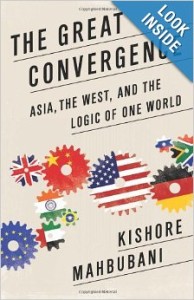
The twenty-first century has seen a rise in the global middle class that brings an unprecedented convergence of interests and perceptions, cultures and values. Kishore Mahbubani is optimistic. We are creating a new global civilization. Eighty-eight percent of the world's population outside the West is rising to Western living standards, and sharing Western aspirations. Yet Mahbubani, one of the most perceptive global commentators, also warns that a new global order needs new policies and attitudes.
Policymakers all over the world must change their preconceptions and accept that we live in one world. National interests must be balanced with global interests. Power must be shared. The U.S. and Europe must cede some power. China and India, Africa and the Islamic world must be integrated. Mahbubani urges that only through these actions can we create a world that converges benignly. This timely book explains how to move forward and confront many pressing global challenges.
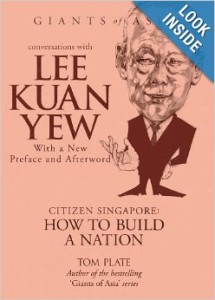
Political genius is never without controversy, or without mystery. This is what makes it so interesting and so rare. Is Lee Kuan Yew the feral, authoritarian figure that Western critics claim? Or a stoic pioneer in new approaches to developing a nation—uncorrupt, modern, almost scientific?American journalist Tom Plate first interviewed the founder of modern Singapore in 1996 in a continuing back-and-forth with LKY that led to the summer of 2009, when the former prime minister agreed to sit down for two days of unprecedentedly informal but intense conversations that led to this special book. This new edition includes fascinating excerpts from prior interviews, as well as the author’s assessment of the man who goes down in history as the world’s longest-serving prime minister—and as one of the most unforgettable political figures of modern times.
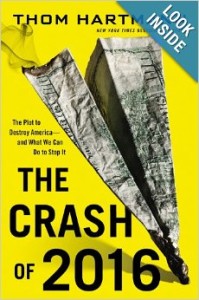
Thom Hartmann
![]() Provocative and Troubling Look at an Impending Economic Implosion, November 16, 2013
Provocative and Troubling Look at an Impending Economic Implosion, November 16, 2013
“The Crash of 2016” is a provocative and troubling look at an economic implosion that will occur unless we take drastic measures to stop it. “A story of how America was dragged into the Crash of 2016.” Well-known progressive national and international radio and TV talk show host and accomplished author, Thom Hartmann places his focus on an economic crisis that may turn into the Fourth Great Crash since the Declaration of Independence in 1776. This stimulating 294-page book includes sixteen chapters broken out by the following five parts: 1. The Economic Royalists and the Corporatist Conspiracy, 2. Why We Crashed, 3. “Oppression, Rebellion, Reformation”, 4. The Great Crash, and 5. Out of the Ashes.
Positives:
1. A professional and gifted author Hartmann is a master at engaging the public with a well- balanced narrative of history, current events and foresight.
2. The book has great format and flow. It's entertaining, enlightening and the pages turn themselves.
3. Hartmann is a great and passionate thinker. His knowledge of history, and his ability to identify patterns is only matched by the skill to convey his conclusions in a lucid, straightforward manner.
4. Troubling, straight-forward eye-opening conclusions. “This crash is coming. It's inevitable. I may be off a few years plus or minus in my timing, but the realities of the economic fundamentals left to us by thirty-three years of Reaganomics and deregulation have made it a certainty. We are quite simply repeating the mistakes of the 1920s, the 1850s, and the 1760s, and we are so far into them it's extremely unlikely that anything other than reinflating the recent bubbles to buy a little time here and there will happen.”
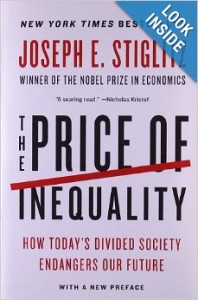
Joseph Stiglitz
5.0 out of 5 stars Ethical Economist Confronts Two-Party Tyranny — Defines 70% of the Way Forward, November 26, 2013
I have admired this economist, one of a tiny handful who are not bought and paid for by the banks, for quite a long time. I'd like to see him at Director of the Office of Management and Budget (OMB), with a Deputy Director for Management that actually has authority for Whole of Government strategy and management. Of course that would require an honest president and an honest congress, so I am not holding my breath on this one.
In passing, I ran for President as an accepted candidate for the Reform Party in 2012 — it only took six weeks to recognize that neither Occupy nor any of the other candidates (there are EIGHT accredited parties in the USA, only 2 of which are allowed to actually run for office) were in the least bit interested in a universal demand for electoral reform and a coalition cabinet. See the six big ideas at bigbatusa.org, where you will also find the author of this book listed as the ideal member of the Cabinet for the OMB function.
There are so many other excellent reviews, I am using my contribution to list his specific recommendation for economic reform, and point to a few other related books that support this extraordinary work. My comments added below are in brackets.
THE ECONOMIC REFORM AGENDA
Continue reading “Review: The Price of Inequality:How Today's Divided Society Endangers Our Future”
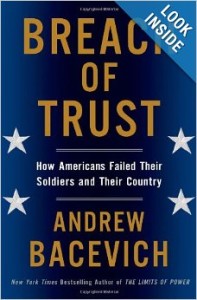
Andrew J. Bacedvich
A disturbing but vitally necessary read. Take note, Mr President, and Congress too
By Timothy J. Bazzett on September 10, 2013
Andrew Bacevich's latest offering, BREACH OF TRUST, is going to make a lot of people squirm – if people read it, that is. Because in this book he tells us flat out that an all-volunteer army in a democratic society simply does not work, and that the present system is “broken.” It is bankrupting our country, and not just financially, but morally. He tells us that Iraq and Afghanistan, two of the longest and most expensive wars in U.S. history, have evoked little more than “an attitude of cordial indifference” on the part of a shallow and selfish populace more concerned with the latest doings of the Kardashians, professional superstar athletes or other vapid and overpaid millionaire celebrities, reflecting “a culture that is moored to nothing more than irreverent whimsy and jeering ridicule.”
Bacevich cites General Stanley McChrystal, former commander of all U.S. and NATO forces in Afghanistan, who spoke about having “skin in the game,” meaning that when a country goes to war every town and city should be at risk. McChrystal went on to say the unthinkable: “I think we'd be better if we actually went to a draft these days … for the nation it would be a better course.”
Horrors! That dreaded “D” word finally uttered aloud. Well, I'd say it's about damn time. And Bacevich agrees, noting that in his many speaking engagements over the past ten years “I can count on one hand the number of occasions when someone did NOT pose a question about the draft, invariably offered as a suggestion for how to curb Washington's appetite for intervention abroad and establish some semblance of political accountability.”
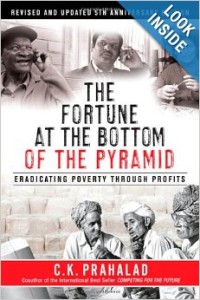
C. K. Prahalad
5.0 out of 5 stars Nobel Prize Material-Could Transform the Planet [But Most Seem to Have Missed the Point], October 24, 2013
There are some excellent and lengthy reviews of this book so I will not repeat anything that has already been said. This book review should be read together with my review of Stuart Hart's Capitalism at the Crossroads: Next Generation Business Strategies for a Post-Crisis World (3rd Edition) which points to several other related books, and Kenichi Ohmae's book, The Next Global Stage: Challenges and Opportunities in Our Borderless World (paperback) All three are published by Wharton School Publishing, which has impressed me enormously with its gifted offerings.
Here's the math that I was surprised to not see in the book: the top billion people that business focuses on are worth less than a trillion in potential sales. The bottom four billion, with less than $1000 a year in disposable income, are worth four trillion in potential sales.
In combination, Prahalad and Hart make it clear that business suffers from the same pathologies as the Central Intelligence Agency and other bureaucracies: they are in a rut.
I will end by emphasizing that I believe this author merits the Nobel Peace Prize. As the U.S. Department of Defense is now discovering, its $500 billion a year budget is being spent on a heavy metal military useful only 10% of the time. Stabilizization and reconstruction are a much more constructive form of national defense, because if we do not address poverty and instability globally, it will inevitably impact on the home front. This author has presented the most common sense case for turning business upside down. He can be credited with a paradigm shift, those shifts that Kuhn tells us come all too infrequently, but when they come, they change the world. It may take years to see this genius implemented in the real world, but he has, without question, changed the world for the better with this book, and make global prosperity a possibility.